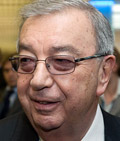The former Russian prime-minister, member of the Russian scientific presidency, and a Russian leading scientist of Eastern countries Yevgeni Primakov held a press-conference on Monday, which among other issues addressed also the issue of new waves of revolutions in many countries in the world. Meanwhile he emphasized that he did not represent the opinions of the Russian government, their political party, neither the scientific organization nor the society, and said that he was expressing his opinions as an individual. Below are some of the questions and answers asked and given during the mentioned press-conference.
– Mr. Primakov, what is happening in the Northern Africa and Middle East? Is this an interconnected process organized by external powers?
– I think the processes you are speaking about are stimulated by social and economic reasons. The disorders that took place in a number of Arabic countries have not been stimulated or organized by external powers. These were local processes. For example, the processes in Egypt generated a shock among the political elite of the United States. This was normal because the leaders of Egypt and Tunisia were implementing an effective anti-terrorism policy according to the interests of the US. The surprising loss of such allies was a shock for their partners overseas. However the shock passed very fast and the Americans integrated with that process very dynamically. Meanwhile, their goal was very difficult as they had to keep the image of a supporter of democracy on the one hand, and try to keep those on the power who could protect the interests of the US. They were able to reach this goal.
– According to your opinion, what is the reason of this chain reaction of public unrests in the region?
– The first reason of the revolutions in the Arabic world is first of all social and economic. People went out to streets because they had not hope to their future. In other words, the crowds of people in those countries were driven by social complaints to the ruling authoritarian and corrupt powers. Corruption is strengthened by the lack of freedom of speech and the fact that the youth have not future there. Young people with good education cannot use their skills and have to do other jobs. All these complaints together resulted in public unrest.
– How will the processes develop in this region?
– There is no need to look for common scenarios. There are too many surprises there. For example, they discovered that the modern processes have a lot of influence on the Arabic youth. This was underestimated, and now we know that the organization that took the Egyptians out to strike was created in the Internet. It is difficult to say how the processes may develop in the future because revolutions are different in different countries. For example, in Egypt and Tunisia the struggle still continues. The unemployment rate is growing and there is a need for products of first consumption. Only this fact can become a reason of conflict between the supporters of change and those who are for stability. Everything will become clear after the publication of the new constitution and setting the date for new elections. Still there are many issues in Libya but the situation is changing and it is becoming more dangerous for Gadhafi.
– Which country will be the next in the list of revolutions?
– The rich Arabic countries have no reasons to worry. I don’t think that for example in Saudi Arabia there may be such revolutions. In that country the state system is different and they are rich. Besides that, their king did an unprecedented thing; he gave money to the people. The majority of the people of Saudi Arabia are in a good financial stance. People should not either expect a new Arabic and Muslim format resulted from the large reforms following the revolutions because the nationalism of the Arabs is pressed down by the nationalism of separate Arabic states. Of course the “Muslim brothers” organization exists, and there are also other organizations like that. But not all of these organizations are supporters of radical Islamism.
– Requests are heard in the international community to affect the revolutionary processes. How and in such a way is it possible to do so?
– It is not right to interfere in those processes at this moment. Nobody should interfere. Certain hotheads in the West are making plans of proposing a military support in the events of the Middle East. These projects are very dangerous. The peculiarity of the Arabic world is that the foreign interference may just cause the counter-effect and especially the military interference.
– Can the Arabic revolutions affect the internal political situation in Russia?
– It is little possible. The Arabic revolutions may affect the situation in Russia in one case. That’s if the Islamists come to power there. Although this may hardly take place it may affect the North Caucasus, where there are Wahabists. But they have nothing in common with Wahabists. But this version is not very possible.

